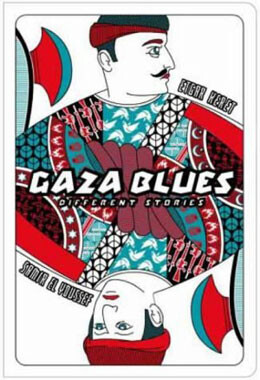The Electronic Intifada 7 March 2006

The snapshot Gaza Blues suitably offers is one of violence and tension. However, it successfully attempts to draw back the curtains on the tragedies and rhetoric of the conflict, its layered subtext forcing the readers to review their understanding of the lives inhabiting the conflict.
Translated by Miriam Shlesinger, Keret’s punchy storytelling offers bleak but sophisticated narrative on daily life, his observations simple but meaningful. In a trilogy of tales, Keret vividly portrays a group of soldiers trapped in enemy territory, driven to further despair by their fellow soldier Shoshi, who simply will not shut up:
“The shooting went on and on, and I began to think that the militants weren’t attacking us out of some foggy fundamentalist motivation, but simply out of a deep-seated urge to get Shoshi to clam up. Shoshi told us that the Syrians teach the Hizbollah to shoot at our radio antennas because that’s where the officers always are. He swore on the life of his grandfather (who had died in Gdansk in ‘42) that there used to be a type of rabbit with tails that looked exactly like antennas and that the irresponsible combat technique of the Hizbollah had practically wiped them out.”
Keret’s pieces also feature a wife who superglues herself to the ceiling in order to regain her husband’s attention, and a doctor who is torn as to whether he should inform a man that his wife, who was killed in a suicide mission, was filled with cancerous tumours and would have died anyway.
Keret’s obscure representations and sharp delivery differ in style to El-Youssef’s more lyrical and expansive storytelling. However, El-Youssef’s writing is punctuated by moments of wry humour and acid-tongued observations on life, delivered through his aimless narrator, Bassam.
In “The Day the Beast Got Thirsty”, Bassam is a doped out Palestinian boy living in a refugee camp in Lebanon. He is waiting for a questionable travel agent to obtain a fake visa for him that will take him to Germany.
Despite murky alliances and a complete lack of any real loyalty, he still listens to his friend Ahmad talk about their “cause”, while dissecting the origin of magical realism with his drug pusher, Salim. As the pills he pops influence Bassam’s mind, an already toxic environment is made even more so as he reaches rock bottom, drowning in drug-induced despair, and talk of realism, politics and the national cause.
Nothing in Bassam’s world is sacred. Bassam constantly affirms that he “really liked listening to Ahmad”, adding that if he ever leaves the country, he would miss him. Bassam finally observes: “But deep down I knew that the moment I would leave this country I would forget everybody and everything. I should forget Ahmad before forgetting anyone else. And if I should remember him at all, I would remember him just as a sort of joke.”
His ambivalence towards his existence subtly encapsulates one of the greatest casualties of the conflict he breathes each day: that there is no hope for a future or something more than this cause.
Keret’s and El-Youssef’s stories complement each other, illustrating how the scorch and hiss of conflict leaves no one untouched. The characters have more than the same geography in common: their lives are intertwined, the frustration, and thirst for survival and meaning, burning through all of them. They share the same reluctance to be defined by their national identities — wanting to live for more than a cause — and are united in their cynicism and affection for irony.
The violence, sentiments and rawness of Gaza Blues can certainly be quite confronting. Yet by pushing aside political grandstanding and presenting a commonality to these fractured lives, the storytellers display a breathing, vivid world of unique existences, illuminated by the two writers’ witty and intelligent, yet deeply contrasting voices.
Amal Awad is an editor based in Sydney, Australia.
Related Links




